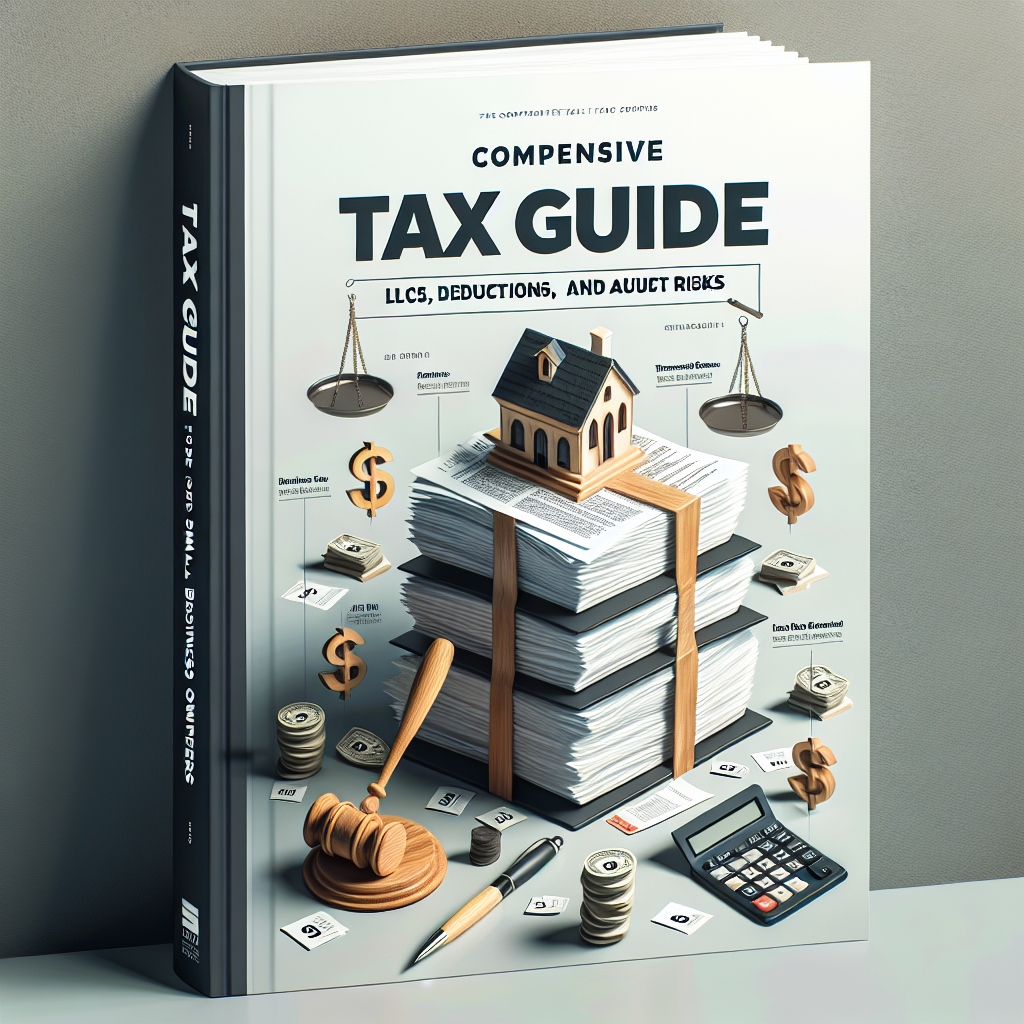-
Table of Contents
- Comprehensive Tax Guide for Small Business Owners: LLCs, Deductions, and Audit Risks
- Understanding LLCs and Their Tax Implications
- What is an LLC?
- Taxation of LLCs
- Maximizing Deductions for Small Business Owners
- Home Office Deduction
- Business Expenses
- Vehicle Expenses
- Depreciation
- Qualified Business Income (QBI) Deduction
- Audit Risks and How to Mitigate Them
- Common Audit Triggers
- Tips to Reduce Audit Risks
- Case Studies: Real-World Examples
- Case Study 1: Single-Member LLC
- Case Study 2: Multi-Member LLC
- Case Study 3: LLC Electing S Corporation Taxation
- Conclusion
Comprehensive Tax Guide for Small Business Owners: LLCs, Deductions, and Audit Risks

Running a small business comes with a myriad of responsibilities, and one of the most critical aspects is managing taxes. For small business owners, understanding the tax implications of their business structure, available deductions, and potential audit risks is essential. This comprehensive guide aims to provide valuable insights into these areas, helping you navigate the complex world of taxes with confidence.
Understanding LLCs and Their Tax Implications
A Limited Liability Company (LLC) is a popular business structure among small business owners due to its flexibility and liability protection. However, the tax implications of an LLC can be complex, and it’s crucial to understand how they work.
What is an LLC?
An LLC is a hybrid business entity that combines the liability protection of a corporation with the tax benefits of a partnership. It offers flexibility in management and ownership, making it an attractive option for small business owners.
Taxation of LLCs
One of the key benefits of an LLC is its flexibility in taxation. By default, an LLC is treated as a pass-through entity for tax purposes, meaning the business itself does not pay taxes. Instead, profits and losses are passed through to the owners (members) and reported on their individual tax returns. However, LLCs can also choose to be taxed as a corporation if it benefits them.
- Single-Member LLC: Treated as a sole proprietorship for tax purposes. The owner reports business income and expenses on Schedule C of their personal tax return.
- Multi-Member LLC: Treated as a partnership. The LLC files Form 1065, and each member receives a Schedule K-1 to report their share of income and expenses on their personal tax return.
- LLC Electing Corporate Taxation: Can choose to be taxed as an S Corporation or C Corporation by filing Form 2553 or Form 8832, respectively.
Maximizing Deductions for Small Business Owners
One of the most effective ways to reduce your tax liability is by taking advantage of available deductions. Here are some common deductions that small business owners should be aware of:
Home Office Deduction
If you use a portion of your home exclusively for business purposes, you may qualify for the home office deduction. This deduction allows you to deduct a portion of your mortgage interest, rent, utilities, and other related expenses.
Business Expenses
Ordinary and necessary expenses incurred in the course of running your business are generally deductible. These may include:
- Office supplies and equipment
- Advertising and marketing costs
- Travel and meal expenses
- Professional services (e.g., legal, accounting)
- Employee wages and benefits
Vehicle Expenses
If you use your vehicle for business purposes, you can deduct either the actual expenses (e.g., gas, maintenance) or use the standard mileage rate (58.5 cents per mile for 2022). Keep detailed records of your business-related mileage and expenses to substantiate your deduction.
Depreciation
Depreciation allows you to recover the cost of business assets over time. The IRS provides guidelines on how to depreciate different types of property, such as buildings, machinery, and equipment. The Section 179 deduction and bonus depreciation can also help you accelerate the depreciation of certain assets.
Qualified Business Income (QBI) Deduction
The QBI deduction, introduced by the Tax Cuts and Jobs Act, allows eligible small business owners to deduct up to 20% of their qualified business income. This deduction is available to pass-through entities, including LLCs, and can significantly reduce your taxable income.
Audit Risks and How to Mitigate Them
While the chances of being audited by the IRS are relatively low, small business owners should still be aware of potential audit triggers and take steps to mitigate their risks.
Common Audit Triggers
Several factors can increase the likelihood of an audit, including:
- High Income: Higher-income individuals and businesses are more likely to be audited.
- Large Deductions: Claiming unusually large deductions relative to your income can raise red flags.
- Cash-Intensive Businesses: Businesses that deal primarily in cash, such as restaurants and retail stores, are more likely to be scrutinized.
- Home Office Deduction: Improperly claiming the home office deduction can attract IRS attention.
- Inconsistent Reporting: Discrepancies between your tax return and information reported by third parties (e.g., 1099 forms) can trigger an audit.
Tips to Reduce Audit Risks
While you can’t completely eliminate the risk of an audit, you can take steps to reduce your chances:
- Keep Accurate Records: Maintain detailed and organized records of your income, expenses, and deductions. This includes receipts, invoices, bank statements, and mileage logs.
- Report All Income: Ensure that you report all income accurately, including cash transactions and income reported on 1099 forms.
- Be Reasonable with Deductions: Only claim deductions that you can substantiate and that are ordinary and necessary for your business.
- File on Time: Filing your tax return on time and paying any taxes owed can help you avoid penalties and interest, which can attract IRS attention.
- Consult a Tax Professional: Working with a qualified tax professional can help you navigate complex tax rules and ensure that your return is accurate and complete.
Case Studies: Real-World Examples
To illustrate the concepts discussed in this guide, let’s look at a few real-world examples of small business owners and their tax situations.
Case Study 1: Single-Member LLC
Jane is a freelance graphic designer who operates her business as a single-member LLC. She works from home and uses a dedicated room as her office. Jane’s business income for the year is $80,000, and her expenses include:
- Office supplies: $1,200
- Advertising: $2,500
- Travel and meals: $1,800
- Home office expenses (portion of rent, utilities, etc.): $4,000
Jane can deduct these expenses on her Schedule C, reducing her taxable income. Additionally, she may qualify for the QBI deduction, further lowering her tax liability.
Case Study 2: Multi-Member LLC
Tom and Sarah run a small consulting firm as a multi-member LLC. Their business income for the year is $200,000, and their expenses include:
- Employee wages: $50,000
- Professional services: $10,000
- Office rent: $12,000
- Equipment purchases: $8,000
The LLC files Form 1065, and Tom and Sarah each receive a Schedule K-1 showing their share of the income and expenses. They can also take advantage of the QBI deduction, reducing their individual tax liabilities.
Case Study 3: LLC Electing S Corporation Taxation
Mike owns a small software development company structured as an LLC. To save on self-employment taxes, he elects to have the LLC taxed as an S Corporation. Mike pays himself a reasonable salary of $60,000 and takes additional distributions of $40,000. The S Corporation files Form 1120S, and Mike receives a Schedule K-1 for his share of the income.
By electing S Corporation taxation, Mike can reduce his self-employment tax liability while still benefiting from the pass-through taxation of an LLC.
Conclusion
Managing taxes as a small business owner can be challenging, but understanding the tax implications of your business structure, maximizing available deductions, and mitigating audit risks can help you navigate the process with confidence. By keeping accurate records, consulting with tax professionals, and staying informed about tax laws and regulations, you can minimize your tax liability and focus on growing your business.
In summary, this comprehensive tax guide for small business owners has covered the following key points:
- The tax implications of LLCs and their flexibility in taxation
- Common deductions available to small business owners, including the home office deduction, business expenses, vehicle expenses, depreciation, and the QBI deduction
- Potential audit risks and tips to reduce your chances of being audited
- Real-world case studies illustrating how small business owners can manage their taxes effectively
By applying these insights and strategies, you can better manage your small business’s tax obligations and achieve financial success.








